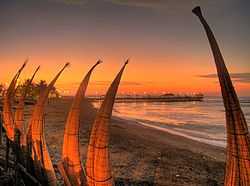World Surfing Reserves
World Surfing Reserves (WSR) is a program launched in 2009 by the organization Save The Waves Coalition aimed at protecting global surf habitats. The program proactively identifies, designates and enshrines international waves, surf zones and surrounding environments.[1]
Background and Mission

The mission of the WSR program is to gain international recognition and support for wave and coastal protection around the world by creating a global network of designated surfing reserves. WSR also recognizes environmental, social, cultural and economic benefits of waves.[4]
Leaders in the international surfing, environmental and scientific communities launched WSR at the Value of Waves Roundtable[5] held in Half Moon Bay, California. WSR was created in conjunction with National Surfing Reserves Australia,[6] and has established partnerships with the International Surfing Association (ISA), and Stanford University’s Center for Responsible Travel (CREST).[7]
World Surfing Reserves is led by an international Executive Committee and Vision Council. It is the responsibility of these groups to govern the program and make the final wave selections. For a specific surf site to enter WSR, the region must have exceptional and consistent surf, along with a rich history and culture of surfing, as well as strong community support.
In August 2009, WSR called for nominations from all national surfing federations.[8] More than 150 sites were nominated from 34 countries. WSR eventually plans to induct 30-40 surf breaks around the world. The program has gained a substantial amount of positive feedback and support from the sport's leaders, including Kelly Slater.[9] You can also read Drew Kampion's World Surfing Reserves Manifesto.[10]
World Surfing Reserves, Council & Committee
Vision Council: Fernando Aguerre, Will Henry, Jim Moriarty, Tony Butt, Terry Gibson, Len Materman, Miles Walsh, Wallace J. Nichols, Steve Hawk, Wayne “Rabbit” Bartholomew, Tiago Pires, Greg Long, Mark Massara, Chris LaFrankie, Chad Nelsen, Neil Lazarow, Brad Farmer, Manolo Lozano, Juca De Barros, Drew Kampion, Professor Andy Short, Professor Ben Finney.
Executive Committee: Professor Andy Short, Brad Farmer, Drew Kampion, Will Henry, Dean LaTourrette.[11]
World Surfing Reserves
Malibu
In partnership with National Surfing Reserves Australia, the International Surfing Association (ISA), and Stanford University’s Center for Responsible Travel (CREST),[12] Save The Waves Coalition inducted Malibu Surfrider Beach as the first World Surfing Reserve site.[13] The official enshrinement ceremony took place on October 9, 2010. The date indicated the commencent of the commitment by the local and international communities to protect and preserve Malibu as an iconic surf site.
World Surfing Reserves are nominated through a selection process and there are currently dozens of proposed WSRs covering nearly every continent on the planet.
Ericeira
The first World Surfing Reserve in Europe, Ericeira, Portugal was dedicated on October 14, 2011.[14] Ericeira stretches 4 km (2.5 miles) and consists of seven separate surf spots, including popular breaks such as Ribeira d’Ilhas and Coxos. Ericeira was recognized for its high density of surf breaks, wave quality, and unique environment. [15]
Manly-Freshwater
On 10 March 2012, the four kilometre stretch between Freshwater Beach and Shelly Beach was declared the "Manly-Freshwater World Surfing Reserve". The Reserve was dedicated in a ceremony on Manly Beach by world surfing champion Kelly Slater accompanied by the Governor of New South Wales, Australia, Professor Marie Bashir.[16]
Santa Cruz
The World Surfing Reserve dedication for Santa Cruz, California took place from April 27-28, 2012, and featured a number of events, including a wetsuit fashion show and a paddle out at Pleasure Point. The official ceremony took place out front the Santa Cruz Surfing Museum, where Pat O'Neil from O'Neill wetsuits and local officials spoke.[17]
Huanchaco
Huanchaco beach is a summer vacation spot located in the northern city of Trujillo, Peru. Huanchaco is famous for several things but particularly for being a surfer's dream spot and its caballitos de totora. The most famous food here is the ceviche. Huanchaco is nearby the very famous ruins of Chan Chan. Throughout 2008 the town underwent significant improvements with all streets being paved with decorative bricks and the main street landscaped with plants.[18] Huanchaco was approved as a World Surfing Reserve by the organization Save The Waves Coalition in 2012 and officially dedicated on October 26, 2013.[19][20]
World Surfing Reserves Google Earth Plug-In
Save The Waves Coalition also created a Google Earth WSR plug-in[21] that allows organizations and individuals to view nominated sites around the world. The plug-in allows users to learn about a nominated wave’s history, location, environmental characteristics and surf culture. [22]
See also
External links
References
- ↑ Save The Waves Coalition Website, World Surfing Reserves Home Page
- ↑ "(spanish) Wetlands of Huanchaco". Retrieved 29 May 2012.
- ↑ "(spanish) Wetlands of Huanchaco". Retrieved 29 May 2012.
- ↑ National Surfing Reserves, Home Page
- ↑ http://www.savethewaves.org/news/view/56/
- ↑ http://www.surfingreserves.org/
- ↑ http://www.responsibletravel.org/
- ↑ Save The Waves Coalition, World Surfing Reserves Nominations
- ↑ March 15, 2010, Surfer Magazine, "Kelly Slater Joins WSR Movement"
- ↑ http://www.savethewaves.org/news/view/110/
- ↑ Save The Waves Coalition Website, World Surfing Reserves Home Page
- ↑ http://www.responsibletravel.org/
- ↑ July 22, 2010, "Malibu World Surfing Reserve" World Surfing Reserves Nomination
- ↑ "Ericeira Rides to World Surfing Reserve Fame". http://www.worldsurfingreserves.org''. Retrieved 31 January 2015.
- ↑ "How Portugal’s big waves are boosting the economy". inquirer.net. Retrieved 31 January 2015.
- ↑ "Kelly Slater Helps Launch Australian WSR". World Surfing Reserves. 2012-03-10. Retrieved 2012-03-11.
- ↑ "Santa Cruz Formally Dedicated". www.savethewaves.org. Retrieved 6 February 2015.
- ↑ http://www.munihuanchaco.gob.pe/historia.php Huanchaco history
- ↑ "Huanchaco-World Surfing Reserve in Peru". Retrieved 3 October 2012.
- ↑ "Huanchaco Dedicated as 5th WSR". www.savethewaves.org. Retrieved 6 February 2015.
- ↑ http://www.savethewaves.org/news/view/91/
- ↑ World Surfing Reserves, Google Earth Plug-In
